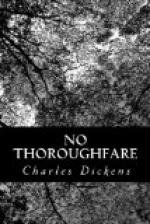“With his—?” Vendale had so slurred the last word, that Wilding had not heard it.
“When travelling with his Niece. Obenreizer’s Niece,” said Vendale, in a somewhat superfluously lucid manner. “Niece of Obenreizer. (I met them in my first Swiss tour, travelled a little with them, and lost them for two years; met them again, my Swiss tour before last, and have lost them ever since.) Obenreizer. Niece of Obenreizer. To be sure! Possible sort of name, after all! ’M. Obenreizer is in possession of our absolute confidence, and we do not doubt you will esteem his merits.’ Duly signed by the House, ‘Defresnier et Cie.’ Very well. I undertake to see M. Obenreizer presently, and clear him out of the way. That clears the Swiss postmark out of the way. So now, my dear Wilding, tell me what I can clear out of your way, and I’ll find a way to clear it.”
More than ready and grateful to be thus taken charge of, the honest wine-merchant wrung his partner’s hand, and, beginning his tale by pathetically declaring himself an Impostor, told it.
“It was on this matter, no doubt, that you were sending for Bintrey when I came in?” said his partner, after reflecting.
“It was.”
“He has experience and a shrewd head; I shall be anxious to know his opinion. It is bold and hazardous in me to give you mine before I know his, but I am not good at holding back. Plainly, then, I do not see these circumstances as you see them. I do not see your position as you see it. As to your being an Impostor, my dear Wilding, that is simply absurd, because no man can be that without being a consenting party to an imposition. Clearly you never were so. As to your enrichment by the lady who believed you to be her son, and whom you were forced to believe, on her showing, to be your mother, consider whether that did not arise out of the personal relations between you. You gradually became much attached to her; she gradually became much attached to you. It was on you, personally you, as I see the case, that she conferred these worldly advantages; it was from her, personally her, that you took them.”
“She supposed me,” objected Wilding, shaking his head, “to have a natural claim upon her, which I had not.”
“I must admit that,” replied his partner, “to be true. But if she had made the discovery that you have made, six months before she died, do you think it would have cancelled the years you were together, and the tenderness that each of you had conceived for the other, each on increasing knowledge of the other?”
“What I think,” said Wilding, simply but stoutly holding to the bare fact, “can no more change the truth than it can bring down the sky. The truth is that I stand possessed of what was meant for another man.”
“He may be dead,” said Vendale.




